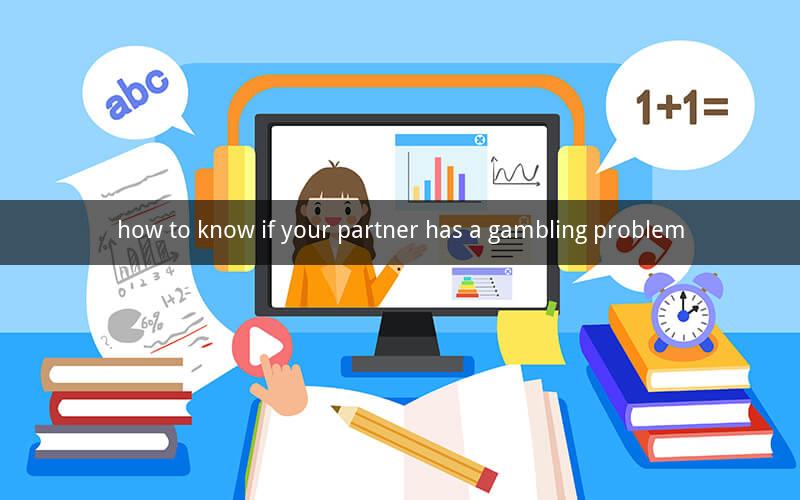
Table of Contents
1. Introduction
2. Signs of a Gambling Problem
3. How to Approach Your Partner
4. The Importance of Professional Help
5. Understanding the Impact of Gambling on Relationships
6. Ways to Support Your Partner
7. Setting Boundaries
8. The Role of Communication
9. The Importance of Self-Care
10. Conclusion
1. Introduction
Gambling can be an enjoyable pastime for many people. However, for some, it can become an addiction that ruins lives and relationships. If you suspect that your partner has a gambling problem, it's important to address the issue and seek help. In this article, we will explore the signs of a gambling problem, how to approach your partner, and ways to support them through this challenging time.
2. Signs of a Gambling Problem
There are several signs that may indicate your partner has a gambling problem. These include:
- Secretive behavior: Your partner may hide their gambling activities from you or lie about how much time they spend gambling.
- Financial problems: They may be struggling to pay bills or cover their expenses, or they may be borrowing money from friends and family.
- Changes in behavior: They may become irritable, aggressive, or distant, or they may start missing work or social events.
- Preoccupation with gambling: They may spend a lot of time thinking about gambling, planning their next bet, or reliving past wins.
3. How to Approach Your Partner
Approaching your partner about their gambling problem can be difficult, but it's important to do so with care and sensitivity. Here are some tips:
- Choose a private and quiet place to talk.
- Express your concerns without being confrontational.
- Use "I" statements to avoid placing blame on your partner.
- Listen to their perspective and be open to their feelings.
4. The Importance of Professional Help
If you suspect your partner has a gambling problem, it's important to encourage them to seek professional help. A therapist or counselor can provide guidance and support for both you and your partner. Additionally, there are support groups and resources available to help those struggling with gambling addiction.
5. Understanding the Impact of Gambling on Relationships
Gambling addiction can have a significant impact on relationships. It can lead to trust issues, financial strain, and emotional distance. It's important to understand that your partner's gambling problem is not a reflection of your worth or the strength of your relationship.
6. Ways to Support Your Partner
Supporting your partner through their gambling addiction is crucial. Here are some ways to do so:
- Encourage them to seek professional help.
- Offer to go with them to therapy or support group meetings.
- Help them create a budget and manage their finances.
- Be patient and understanding, even when it's difficult.
7. Setting Boundaries
Setting boundaries is important for both you and your partner. This may include:
- Limiting contact with friends who encourage gambling.
- Avoiding financial situations that may trigger their addiction.
- Establishing a no-gambling rule in the home.
8. The Role of Communication
Open and honest communication is essential in dealing with a gambling problem. This includes:
- Expressing your concerns and feelings without being confrontational.
- Listening to your partner's perspective and validating their emotions.
- Working together to find solutions to the problems caused by gambling.
9. The Importance of Self-Care
Taking care of yourself is just as important as supporting your partner. This may include:
- Seeking support from friends and family.
- Engaging in activities you enjoy.
- Practicing self-care and stress management techniques.
10. Conclusion
Dealing with a partner's gambling problem is challenging, but it's possible to navigate this difficult time with care and support. By recognizing the signs of a gambling problem, approaching your partner with sensitivity, seeking professional help, and practicing self-care, you can help your partner overcome their addiction and rebuild your relationship.
Questions and Answers
1. What are the most common signs of a gambling problem?
2. How can I approach my partner about their gambling problem without causing a confrontation?
3. Is it normal for my partner to become secretive or distant when they have a gambling problem?
4. What resources are available to help someone struggling with gambling addiction?
5. How can I support my partner through their recovery process?
6. What role does communication play in dealing with a gambling problem?
7. How can I set boundaries with my partner to prevent their gambling from affecting our relationship?
8. What can I do to take care of myself while supporting my partner through their addiction?
9. Can a gambling addiction be cured?
10. How can I help my partner rebuild trust in our relationship after a gambling addiction?